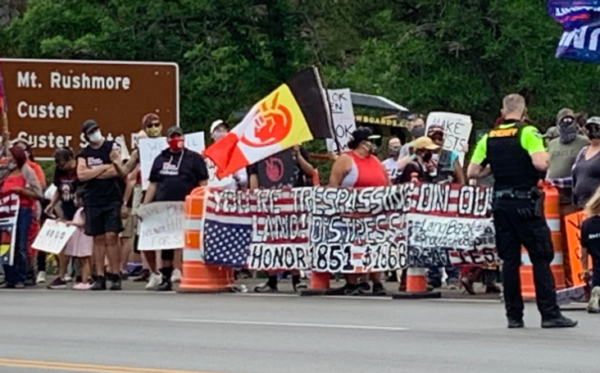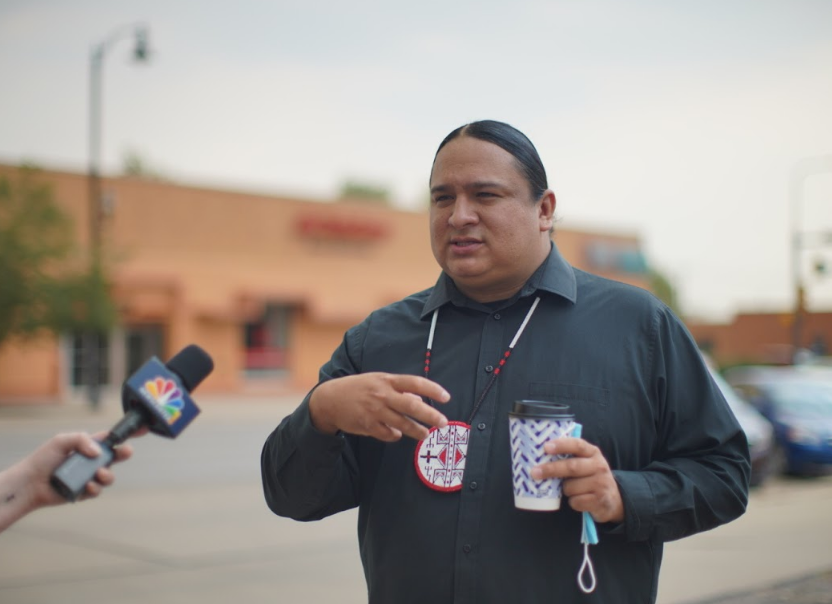
- Details
- By Darren Thompson
RAPID CITY, S.D. — According to a statement made by NDN Collective on March 22, 2021, the Pennington County State’s Attorney’s office proposed a dismissal of all criminal charges against individuals charged for an organized protest outside the Mount Rushmore National Memorial last July 3, 2020.
The demonstration was organized largely by NDN Collective, an Indigenous advocacy organization based in Rapid City, South Dakota, during a visit to the Black Hills by former President Trump, who defied coronavirus precautions by calling for large gatherings despite rising numbers of cases in South Dakota.
The demonstration led to the arrests of twenty adults and one juvenile by the Pennington County Sheriff’s Office. Most were charged with misdemeanors. One of the 21 arrested was a counter-protestor from Buckeye, Arizona.
President and CEO of NDN Collective Nick Tilsen was charged with a felony crime and his charges haven’t been officially dismissed according to the Pennington County State’s Attorney’s office.

“I feel good about the decision being made (to drop all charges against demonstrators),” Tilsen said in a telephone interview with Native News Online on Wednesday. “It’s a victory because they (the Pennington County State’s Attorney’s Office) came to us with a proposal.”
“All of the organizing, petitions, and support from the thousands of people matters,” Tilsen said. “When they try to over-criminalize and over-police us while also limiting free speech through intimidation tactics, they know we’re going to come swinging back.”
NDN Collective gathered over 20,000 signatures from an online petition, sent hundreds of letters and phone calls to the State’s Attorney’s office and led an aggressive media campaign, according to a statement by the organization.
Tilsen was charged with second-degree robbery and grand theft in the alternative, meaning he could only be convicted of one of those charges related to allegedly stealing a shield from a woman in the National Guard. He was also charged with two counts of simple assault against law enforcement officers and three misdemeanors: standing on highway with intent to impede-stop traffic, failure to vacate/ordered to leave, and disorderly conduct-unlawful assembly. He faced three felonies and the possibility of being sentenced to up to 17 years in prison.
He agreed to participate in a prison diversion program in exchange for simple assault of a law enforcement officer to be dropped once he completes the program. Once he completes the program, all other charges will be dropped against 19 other individuals who were arrested for demonstrating in Keystone, S.D. near the Mount Rushmore National Memorial.
The demonstration on July 3, 2020 was organized to protest former President Trump’s visit to the Black Hills and the Mount Rushmore National Memorial—a symbol of white supremacy for many—while asking for the Black Hills to be returned to the Lakota People. Demonstrating at Mount Rushmore has been a decades-long fight by many Lakota to uphold the 1868 Fort Laramie Treaty. The treaty designates the Black Hills as part of "the Great Sioux Reservation, set aside for exclusive use by the Sioux people."
“This is the beginning, not the end,” Tilsen said. “There is immense strategy being built around returning public lands in the Black Hills back to the Lakota people.”
Previously, Native News Online reported on July 4, 2020 that many of the participants, who were Lakota, were targeted for their demonstrations in their homelands.
“The issue with Mount Rushmore—that’s not a dead issue,” said Tilsen. “It is definitely a conversation we’re going to continue to push for.”
The Pennington County State's Attorney's office did not respond to an email request to confirm why the charges were dropped.
“We want to thank everyone for their sacrifice on July 3, 2020,” Lakota People’s Law Project Lead Counsel Chase Iron Eyes said to Native News Online. “The only way our land rights, inherent rights live is if we exercise them.”
“We face a war everyday meant to absorb us and erase us,” said Iron Eyes. “I am relieved for Nick Tilsen—he was way overcharged. I am grateful for Nataanii Means, Krystal Two Bulls, Tonia Stands, Juliana Brown Eyes, Tyler W. and others who carried #landback into today.”
Pennington County State’s Attorney Mark Vargo had a different response to the announcement on Monday, March 22 by NDN Collective. “As far as Nick Tilsen is concerned, none of his charges have been dropped,” said Pennington County State’s Attorney Mark Vargo to Native News Online. “We have agreed to a diversion program, which includes an admission of guilt and, according to the statement that was made on Monday, it appears Tilsen isn’t taking responsibility for his criminal behavior.”
The diversion program at the Pennington County State's Attorney Office is open to people with no or little criminal history. Participants usually must stay out of trouble for a year and complete court-mandated tasks to improve their behavior and life and the charge and arrest will be expunged from a person’s record.
“As far as the agreement with Tilsen is concerned, there is no such contract, yet,” said Vargo. “Usually, it will include a person to be system free for a year, but before that contract is signed, there must be an acknowledgement of felony criminal behavior.”
“This case is as much about racial equity as it is about Indigenous rights and land back,” Tilsen said.
More Stories Like This
Native News Weekly (August 25, 2024): D.C. BriefsUS Presidents in Their Own Words Concerning American Indians
Two Murdered on Colville Indian Reservation
NDAA passes House; Lumbee Fairness Act Advances
NFL, Vikings to Host Native All-American Game, Youth Flag Clinic
Help us defend tribal sovereignty.
At Native News Online, our mission is rooted in telling the stories that strengthen sovereignty and uplift Indigenous voices — not just at year’s end, but every single day.
Because of your generosity last year, we were able to keep our reporters on the ground in tribal communities, at national gatherings and in the halls of Congress — covering the issues that matter most to Indian Country: sovereignty, culture, education, health and economic opportunity.
That support sustained us through a tough year in 2025. Now, as we look to the year ahead, we need your help right now to ensure warrior journalism remains strong — reporting that defends tribal sovereignty, amplifies Native truth, and holds power accountable.
 The stakes couldn't be higher. Your support keeps Native voices heard, Native stories told and Native sovereignty defended.
The stakes couldn't be higher. Your support keeps Native voices heard, Native stories told and Native sovereignty defended.
Stand with Warrior Journalism today.
Levi Rickert (Potawatomi), Editor & Publisher
